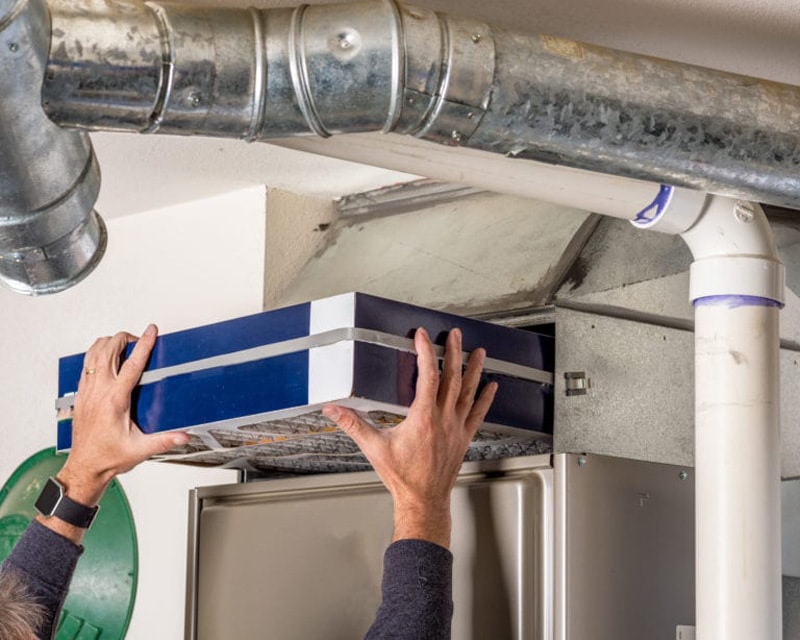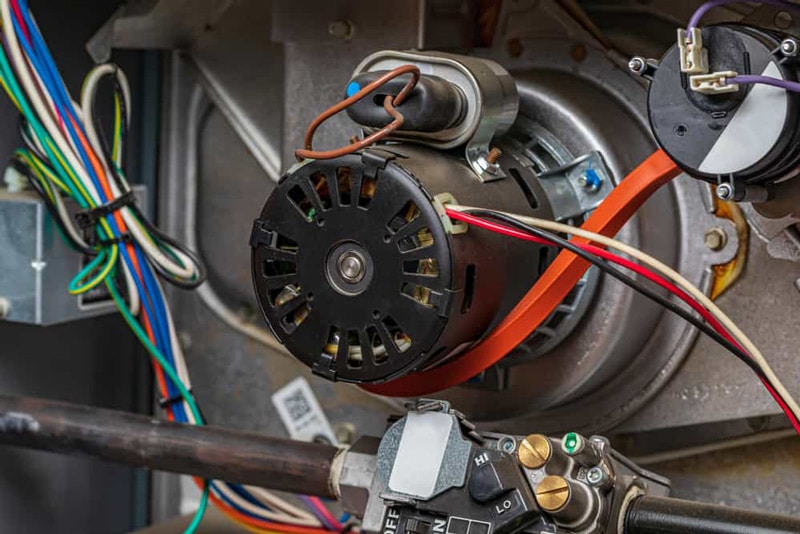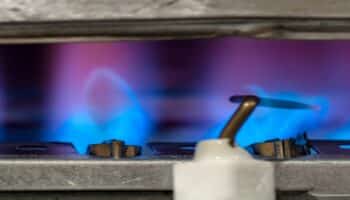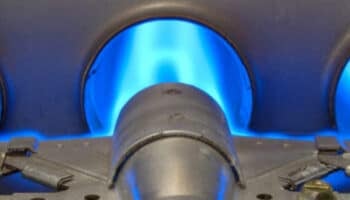We've independently reviewed this article to make sure it's as accurate as we can make it.
To find out more about our article creation and review process, check out our editorial guidelines.
One of the worst possible things that could happen on a cold winter day is to realize your furnace isn’t blowing any hot air.
If that’s what happened to you and you’re looking for reasons why, keep reading. I’ll take you through a list of possibilities and provide you with fixes.
But first, let’s go over the basics of how a furnace works, as this understanding may help you source your problem.
Furnace Basics: How They Work
Here’s a quick overview of the heating cycle of a forced air gas furnace.
- Natural gas is piped to your furnace to ignite its burner.
- Once the burner is lit the resulting flames heat a metal heat exchanger.
- The resulting heat is transferred to incoming air.
- Your furnaces blower motor then forces that heated air into your ductwork from where it is distributed via supply vents throughout your home.
- As warm air pushes into each room cold air, which is denser, is returned to the furnace through the return air vents in the room.
Since natural gas is combustible,furnaces are equipped with several safety features, and one of those features is to watch for temperatures that get too high.
5 Reasons Why Your Furnace May Not Be Blowing Hot Air
So let’s talk about some reasons why your furnace has stopped working properly. Some of them will be easy fixes and not a matter of significant concern. Others will need to be dealt with by an HVAC professional.
1. Make Sure Your Furnace is Turned on
I know you’re thinking to yourself, “Well, duh. Of course, my furnace is on!” But do yourself a favor and confirm that’s the case. Someone may have inadvertently switched off the power to your furnace.
Solution: Check to see if there is a power switch on the furnace itself and if not, look for one on the wall close by.
2. Clogged Air Filters
Many furnace and air conditioner issues can be traced back to dirty air filters. In most cases, filters should be replaced every three months, however, there is some leeway with that depending on your household.
If filters are not regularly replaced or cleaned, they will collect dust, debris, pollen, pet dander, hair, and more. Eventually, this will buildup to the point where it impedes airflow and potentially causes your furnace to overheat.
If your furnace does overheat, one of the safety measures mentioned above will kick in and shut your furnace down. Then warm air will no longer circulate throughout your home.
Solution. Check to see if your filters need to be changed or cleaned. Always stay up to date on filter maintenance, as dirty filters are the reason behind many HVAC problems.

3. Electrical Problems
There are many possible causes for electrical issues with your furnace, so it can be difficult to source what’s causing the problem. But here are a few things you can check:
Loose wiring: Over time, thanks to the constant vibration of your furnace, some internal wiring may be become loose. If that happens, it could cause a short or other electric issues.
Blown Fuse or Tripped Breaker: If your furnace isn’t running at all check to see if you have a tripped breaker or a blown fuse.
4. Blocked Registers
Each HVAC system is designed to require a specific amount of airflow. If that airflow is impeded in any way it will disrupt the functions of your furnace.
It’s typically okay to partially close registers or supply vents but blocking them entirely will eventually cause problems with your blower motor and stop moving hot air throughout your home.
Solution. Make sure no supply or return vents are completely blocked. This isn’t restricted to simply closing the vents. You also need to be sure not to block them with furniture.
It’s also a good idea to remove the grills and make sure nothing is blocking them from inside.
5. Faulty Capacitor
Your HVAC system has a very basic job—create and move warm or cool air throughout your home. It’s your blower motor’s job to make that happen.
Once the blower motor powers on, it’s the job of the capacitor to maintain a steady supply of electricity and keep your fan running smoothly.
If your capacitor has stopped functioning properly it won’t keep the fan running as it should, and you won’t be getting any hot air blowing throughout your home.
Solution. There are a few things you can check to see if you have a problematic capacitor.
- Crank up the thermostat and listen for your fan to start up within a few moments. Or stay near one of your registers to feel the forced air blowing out.
- Listen for a humming sound when the motor starts spinning. There’s a gradual increase in speed when the motor starts.
- If you hear the hum but the motor isn’t starting, then you have something restricting the motor—and it could be the capacitor.

If you determine that your capacitor needs replacing you can do so yourself. The part is around $10 and it’s a fairly simple job. You can watch the video below for a step-by-step tutorial.
Conclusion
Fortunately, several of the reasons behind the furnace not blowing hot air only require simple fixes.
To recap:
- Your furnace may not be turned on
- Clogged air filters
- Electrical problems
- Blocked registers
- Faulty capacitor
Check to see if any of those are the cause of your problem. In most cases, if you keep up with regular maintenance, a lack of airflow will never be an issue.
Thanks for reading through. Why not check out our related posts below to see if there’s anything else that we can help you with?







